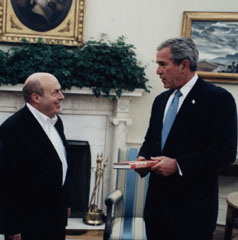Natan Sharansky Makes The Case for Democracy

|
|
In The Case for Democracy (which Sharansky wrote with his longtime friend and adviser Ron Dermer), Sharansky culls from his experience as a Soviet dissident and takes a close analytical look at non-democratic societies to make the case for why the path away from "terror and tyranny" and a "fear society" is the road to democracy. He also details his theories as to why the "security of the free world depends on using all possible leverage -- moral, political, and financial -- to support democracy."
Following the book's publication in November, President George Bush met with Sharansky in the Oval Office, and, in late January, Bush told the International Herald Tribune that Sharansky's book "confirmed what I believe." The Tribune also reported that the book was a "leitmotif in Bush's Inaugural Address about ending tyranny."
Recently, BTW conversed with Sharansky via e-mail regarding President Bush's comments, Iraq, and The Case for Democracy.
BTW: Did it surprise you when you found out that President Bush would use the theories you discuss in your book as part of the basis for his foreign policy in the latter stages of his first term and going forward in his second term?
Natan Sharansky (NS): Yes. But after my meeting with the President, it was clear to me that he believed in these ideas very deeply. He is convinced, like me, that freedom's appeal is universal, that the expansion of freedom is essential for international security and that the free world has an important role to play in helping fear societies become free.
BTW: Many would argue that President Bush and his policies have been a polarizing force here in the U.S. and abroad. Since the President has been such a vocal proponent of your ideas, the theories in your book have been touted by some in the media as being "neoconservative" or "right wing." How do you react to such characterizations?
NS: As I write in the book, I do not believe that this is a matter of Left and Right, but rather of Right and Wrong. Freedom does not belong to one party or one ideology. Senator [Henry] Jackson was a great champion of these ideas, and he was a Democrat. Reagan was a Republican. I believe that these ideas should unite people of all political stripes. Those on the right primarily concerned with security should understand that free societies are essential for security. And those on the Left primarily concerned with human rights should understand that free societies are essential for human rights. The expansion of freedom is what should unite everybody.
BTW: Here in the States there's been extensive coverage regarding the recent elections in Iraq. How do you suggest one promotes democracy in countries that have never known freedom, or haven't known it in a very long time? For example, Russia has been grappling with democracy since 1989. Also, some hope there will be a kind of "domino theory" for democracy, as many in the 1950s and 1960s believed there was for communism -- do you agree (e.g., if democracy takes hold in Iraq, other countries will follow suit)?
NS: The best way to promote democracy abroad is for the democratic world to link its policies toward non-democratic regimes to the expansion of freedom within those societies. The road to democracy can be very long and there can be ups and downs (as there is in Russia today), but people fundamentally want to be free. The peoples of non-democratic societies are the greatest ally the free world has in helping promote democracy. If we link our policies to helping them become and remain free, then we will help freedom take root and endure. In the end, that is why democracy spread to Japan, Germany, Latin America, and Russia. As to whether democracy is contagious, I am sure that it is. When a fear society becomes free it gives hope to people living in fear everywhere that they too will win their freedom.
BTW: Many have said that the election of Mahmoud Abbas as President of the Palestinian National Authority (PNA) opens the door to a renewed hope for substantial progress toward a lasting peace. How do you view the recent election?
NS: No doubt there is a new opportunity. Sometimes it is easier for new leadership to change the course of a country or a people from the direction of past leaders because they are not fully responsible for the decisions of the past.
The most important reason for optimism, however, is that the leader of the free world believes and is saying openly that the only path to peace and security in the Middle East is to expand and promote democracy.
Will it really happen? That is still a very big question, and I am very, very cautious. The question is whether the world will make a linkage between democratic reforms in Palestinian society and the peace process. -- Interview by David Grogan


